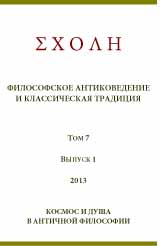DISCUSSIONS ON THE ETERNITY OF THE WORLD IN ANTIQUITY AND CONTEMPORARY COSMOLOGY
DISCUSSIONS ON THE ETERNITY OF THE WORLD IN ANTIQUITY AND CONTEMPORARY COSMOLOGY
Author(s): Michael ChaseSubject(s): Philosophy
Published by: Новосибирский государственный университет
Keywords: creation; cosmology; Big Bang; Pherecydes; Origen; Athanasius; Plotinus; Porphyry; Ammonius Saccas; Proclus; John Philoponus; al-Kindi; Neoplatonica Arabica
Summary/Abstract: This contribution continues the comparison between ancient and modern beliefs on scientific cosmology which began in a previous article in this Journal (ΣΧΟΛΗ 5.2 [2011]). I begin with a brief survey of contemporary theories on Big Bang cosmology, followed by a study of the cosmological theories of the Presocratic thinker Pherecydes of Syros. The second part of my paper studies the ramifications of the basic Platonic principle that bonum est diffusivum sui. I begin by studying the vicissitudes of this theory in the Patristic thought of Origen, the Arians, and Athanasius. Following Willy Theiler, I suggest that similarities between the views of Origen and the Neoplatonist philosopher Porphyry of Tyre may be traceable to Plotinus' teacher Ammonius Saccas. Finally, following Endress, I study the way the Arabic translation of some propositions from Proclus' Elements of Theology were accompanied by interpolated glosses derived from the Christian Neoplatonist John Philoponus, which were designed to make Proclus' thought more acceptable to a creationist, Monotheistic belief system such as Islam. Philoponus' theories of instantaneous creation were taken up, thanks to al-Kindi, by the Neoplatonica Arabica, whence they exerted an important influence on the development of Islamic thought. An Appendix of texts with translation and bibliography completes the article.
Journal: ΣΧΟΛΗ. Философское антиковедение и классическая традиция
- Issue Year: VII/2013
- Issue No: 1
- Page Range: 20-68
- Page Count: 49
- Language: English

